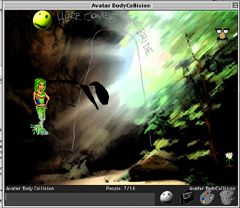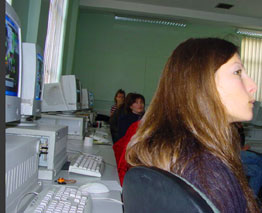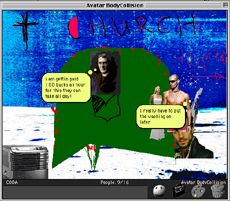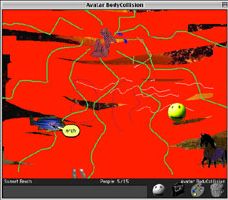Karla Ptacek and Helen Varley Jamieson led a one-day cyberformance workshop at Manchester Metropolitan University on 28 February 2004, organised by Nancy Reily-McVittie. A third Collider, Leena Saarinen, joined the group online from Helsinki in the afternoon.
This workshop achieved the best result we could imagine: some of the
participants have been inspired to start their own cyberformance company,
and are meeting online twice a week as well as once a month in RL. We
look forward to their debut!
 Goal
Goal
Participants were to gain general skills in the use of the relevant applications so that they could continue to explore the ideas beyond the workshop, and devise and perform a short online cyberformance during the workshop. We had the added opportunity of a performance space, which meant participants could experiment with the staging of cyberformance for a proximal audience.
Participants
The participants were mostly performance studies students, some of whom already had some cyberformance experience; other participants included staff, arts students and local artists.
Resources
The workshop was held in a computer lab, enabling each student to work on an internet-connected computer; the computers had the Palace software installed, and headphones were provided to avoid a cacophany of chat. A performance space was also booked, with one internet connection, and both spaces had a data projector.
 Content
Content
The workshop began with a presentation by Helen and Karla about cyberformance and Avatar Body Collision's work. The historical and artistic context was outlined, including the roots of cyberformance, and related artists and art forms.
Participants then moved onto the computers and began to learn the tools and techniques of the Palace. They learned to source and wear avatars, speak, change their names, use props and painting tools, and move around the Avatar Body Collision palace as well as public palaces.
After lunch, the participants were divided into groups of 3 or 4 and given a section of text to use as a starting point in devising a short cyberformance. Helen and Karla moved among the students, giving one-to-one assistance where necessary and providing additional commentary including theoretical context, theatre techniques and anecdotes.
 Each group then performed their cyberformance for the others. As time was short, there was a fair amount of improvisation, and plenty of laughs. The participants were able to experience the immediacy of creating work in real-time, with the added benefit of a responsive proximal audience.
Each group then performed their cyberformance for the others. As time was short, there was a fair amount of improvisation, and plenty of laughs. The participants were able to experience the immediacy of creating work in real-time, with the added benefit of a responsive proximal audience.
"One of the things i found inspiring was how liberating people found improvising and twisting gender / id / sexuality - how free they were - i was to enter areas of language and action that would take weeks to arrive at - with a group - " Michael Mayhew, artist.
Lastly, we moved to the performance space, taking one laptop with us. Three participants remained in the computer lab, creating a live feed which was projected in the space, allowing the participants to experiment as live performers interacting with virtual and remote characters. The scenography of the space - specifically the data projector and computer screen - were discussed and examined in the context of the theatre space.
 Conclusion
Conclusion
The workshop was originally planned for two days but for various reasons ended up being compressed into one, meaning that some content could be only briefly touched on (such as UpStage and the physical work in the performance space). However, the participants picked everything up very quickly and kept up with the rapid pace of the day. By the end, everyone was exhausted, but very inspired and satisfied.
"Very exciting world you're working in ... thanks for the w/shop it was ace" Michael Mayhew, artist.